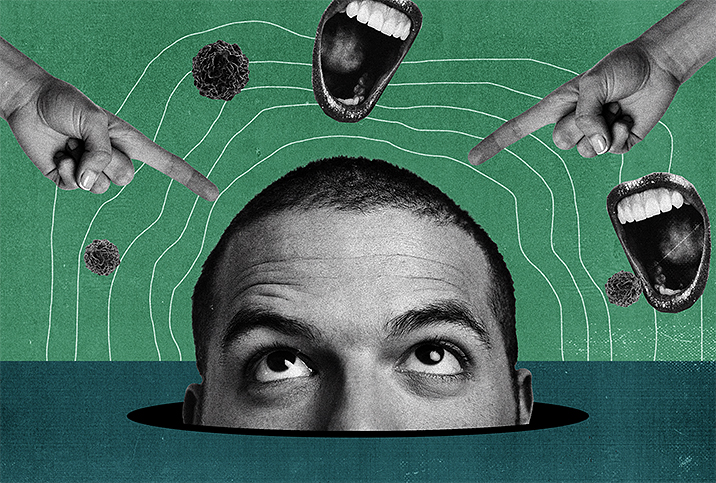Please Stop Believing These Testicular Cancer Inaccuracies

Let's be clear: If you find out you have testicular cancer, you are allowed to feel the gamut of emotions, including fear, anxiety and confusion. Any type of cancer diagnosis is often an overwhelming and traumatic event, and it will come with a lot of difficult feelings to sort through.
However, a cancer diagnosis also comes with a lot of information—and some of it may be inaccurate. Before you dive into dealing with your diagnosis, be sure you have the facts about testicular cancer.
Inaccuracy #1
It will make you infertile
One of the most commonly held myths about testicular cancer is that it makes men infertile. Testicular cancer is primarily a younger man's disease—the average age at diagnosis is only 33—and men in that age range may be worried about how the cancer will affect their ability to produce children. The testicles play a crucial role in the male reproductive system through the production of testosterone, a sex hormone that regulates the production of sperm.
Treatment for testicular cancer typically involves the removal of the cancerous testicle. The American Cancer Society notes that in some cases, full fertility in the remaining testicle can return.
As long as the testicular cancer is localized and chemotherapy isn't necessary, one testicle will be enough for fertility, said Abhinav Sidana, M.D., M.P.H., an assistant professor of surgery and the director of urologic oncology at the University of Cincinnati College of Medicine.
Regardless of the testicle's function in fathering a child after cancer treatment has stopped, it's standard procedure for anyone scheduled to undergo treatment to bank sperm, according to Jennifer Linehan, M.D., a urologist and an associate professor of urologic oncology at the Saint John's Cancer Institute at Providence Saint John's Health Center in Santa Monica, California. Unless the individual is older and conceiving children is no longer a consideration, urologists virtually always recommend patients make a deposit at a sperm bank.
"It's easy and cheap to do," Linehan pointed out, making sperm preservation a no-brainer step to take for peace of mind for future fertility.
Anyone worried about the quality of banked sperm can set that fear aside, too. Studies indicate semen samples from sperm banks yield acceptable pregnancy rates through artificial insemination and do not raise the risk of birth defects.
Inaccuracy #2
It will cost you both testicles
Testicular cancer most commonly strikes in only one testicle, but many people mistakenly believe that even if the one affected testicle is removed, the cancer will spread to the other one.
Linehan noted she sees this fear more often in younger men with testicular cancer, but she was quick to dispel it.
"I see a lot of these patients who are afraid of removing one testicle because they think that it will come back in the other testicle, but this is actually very rare," she said.
Inaccuracy #3
It will rob you of all your testosterone
Linehan has found many people think the removal of one testicle to treat the cancer will result in inadequate testosterone levels. While it is true that removing a testicle will affect testosterone production, it won't be a noticeable change, she explained. For instance, aspects such as sexual function, ejaculation and muscle mass won't generally be impacted. In many cases, if one testicle has to be removed, the other can still produce an adequate amount of testosterone.
"One testicle is almost as good as having two," Linehan noted.
A 2020 study in Trends in Urology & Men's Health looked at testosterone deficiencies following testicular cancer and found increased cortisol levels from the stress of worrying about treatment could actually lower testosterone levels, too. Then, when testosterone levels lower and cortisol increases, it actually makes your stress worse, creating a vicious cycle.
If you can, try not to stress about treatments, especially before you have all the correct information and options from your doctor.
Inaccuracy #4
It will ruin your sex life
In a similar vein, since testosterone controls libido, men may fear their sex life will be disrupted.
Certainly, the initial impact and treatment involved with testicular cancer may impede a man's sex life, but you should not expect your sex life to be ruined. In fact, addressing your sex life and ensuring your quality of life is a primary part of dealing with testicular cancer and one of the many ways in which your doctor will guide your care.
As for the physiological impact of treatment, even the removal of one testicle will not change a man's sexual abilities.
"One testicle will still produce hormones, so they can have normal sexual activity and fertility if the other testicle is working normally," Sidana said, adding that even if chemotherapy is necessary, it shouldn't affect the ability to have sex. "Chemotherapy might compromise fertility, but it still doesn't compromise sexual function. The hormone production continues."
Inaccuracy #5
It's not a serious cancer
The notion that testicular cancer isn't serious is a challenging misconception to navigate. On the one hand, it is true that testicular cancer has some of the highest five-year relative survival rates of any type of cancer; on the other hand, it's still cancer and has to be treated.
According to Linehan, some men may be more concerned about the complications from treatment—such as the removal of the testicle, the impact on libido and limited testosterone production—than they are about the cancer itself.
She has also found some patients mistakenly think that once the affected testicle is removed, they're good to go. While in most cases the cancer doesn't return, it's still very important for testicular cancer patients to attend their follow-up appointments and imaging tests. Doctors will need to continue to monitor the chest, abdomen and pelvis to check for any complications or problems down the road.
"It's a serious cancer," Linehan said. "But it's also very treatable if you're on top of it."


















